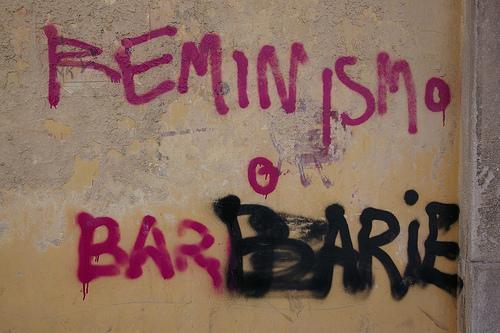Discussion: Feminism in post-revolutionary Nicaragua
LARuta/Noticias - 16.05.2011 17:42
Gender and sexuality are increasingly recognized as central to ‘development’. This is also reflected in the millennium development goals. However feminist and sexual rights movements in Latin America are countered by the proliferation of social conservative movements, also known as “pro-life” movements. On Monday 30 of May LA Ruta organizes a Masterclass on these “pro-life” movements in the context of Latin America and in post- revolutionary Nicaragua specifically. During this Masterclass Silke Heumann, lecturer at the Institute of Social Studies in The Hague, will reflect upon the emergence and growth of the ‘pro-life’ movement and discuss what the pro-life movement is, who is part of it, what its strategies are and how it relates to regional and international organizations and networks.

Feminismo o barbarie
Facing the challenges to gender equality and sexual and reproductive rights: The proliferation of “pro-life” activism in post-revolutionary Nicaragua
Masterclass on Gender and the Millennium Development Goals.
Gender and sexuality are increasingly recognized as central to ‘development’. This is also reflected in the millennium development goals. Especially the MDGs related to maternal mortality and access to reproductive health services (MDG 4), HIV (MDG 6), gender equality (MDG 3) and access to education (MDG 2) are directly related to women's rights, as well as to sexual and reproductive rights.
However, feminist and sexual rights movements in Latin America are countered by the proliferation of social conservative movements, also called “pro-life” movements. These conservative movements are often equated with the churches and with “traditional” religiosity, in Latin America mainly with Catholicism. This gives a wrong image of what these movements are about and how they operate: while religion plays an important role as a legitimizing and mobilizing tool, the “pro-life” movement is much about politics and is better understood as a social movement.
Based on the case study of Nicaragua Silke Heumann will elaborate on “pro-life” movements from a social movement perspective. She will contextualize and explain the emergence and growth of the “pro-life” movement in post-revolutionary Nicaragua and discuss who is part of it, what its goals and strategies are and how it relates to regional and international organizations and networks. Central to her lecture is the question of how changing political contexts affect the dynamics of social conservative activism and account for their relative success.
Silke Heumann is a Lecturer in the specialization of Women, Gender and Development at the International Institute of Social Studies in The Hague. She studied Sociology with a specialization on Gender, Sexuality and Culture, as well as Development Studies. Her research interests include gender and sexuality, social movements, discourse analysis and politics. Her regional interest is Latin America. She has lived in Nicaragua studying and working on issues of gender based violence, sexual and reproductive health and rights, as well as different forms of discrimination based on gender, sexuality, ethnicity, age, and class.
LA Ruta challenges you to discuss these challenging issues with us!
Date: Monday 30 of May
Time: 16.00-18.00.
16.00-16.15 doors open.
16.15 -16.30 introduction LA Ruta + short videos
16.30- 17.15 lecture by Silke Heumann
17.15 - 18.00 discussion
18.00-18.30 drinks
Location: Room 3.26 at the International Institute of Social Studies, Kortenaerkade 12 in Den Haag.
Free Entrance.
 E-Mail: info@laruta.nu E-Mail: info@laruta.nu  Website: http://www.laruta.nu Website: http://www.laruta.nu
|

